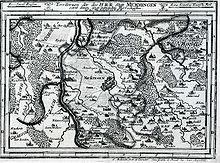Memminger article
The Memmingen Articles were a complaint and petition from the farmers to the council of the Upper Swabian town of Memmingen in 1525. They are not to be confused with the twelve articles that were also written down in Memmingen along with the federal regulations .
history
The Memmingen articles are related to the introduction of the Reformation in Memmingen. On February 16, 1525 there was a note in the minutes of the council that the Steinheim farmers demanded that they choose their own pastor who only teaches according to the new doctrine and that they may cut wood themselves. Other villages on the city's territory (approximately 25) also demanded certain concessions from the city. On February 23, 1525, the city asked the farmers to nominate a four-person committee to collect the complaints and bring them to the council. The committee from 27 villages in the city met on February 24th. Instead of specific individual complaints , however, a fundamental demand was put forward: “After a few counseling you have a good knowledge of how the gospel is now by two graces of God, to whom be praise and He, because now we will invent ourselves vil evil abuses, so the word of God entirely to be opposed and disgusting, also to the common poor man vastly arduous and insufferable, according to this our common bit and desire is in EeW, we want to stick to the exposition and content of the divine word and let us stay with it. What then nimps and gives us the same divine word, we may always gladly accept and stay with the same ” . The peasants no longer wanted to fulfill their traditional duties towards the city, but only those who were in harmony with the Holy Scriptures . The council insisted on specific demands made by the farmers four days later:
- 1. Article: Free election of pastors. If the pastor preaches the pure Gospel according to the wishes of the congregation, he should be paid directly by the congregation; if he preaches differently, he can be replaced by the congregation at any time.
- Article 2: On the basis of the declaration that the pastor himself is supported, the tithe is to be abolished. This is anyway not compatible with the Holy Scriptures.
- Article 3: Serfdom is to be abolished.
- 4. Article: Hunting and fishing should be released.
- Article 5: The compulsory labor should be reduced to a reasonable level.
- Article 6: The treasure should be kept.
- Article 7: The penalties for serious crimes should be reduced to the old level.
- 8th article: The land that used to belong to the community is to be returned to the community.
- 9. Article: The agricultural products (e.g. grain, meat, milk) should be allowed to be freely sold by the farmers.
The final sentence of the articles was that if one of the requirements is incompatible with the Bible, it should be deleted without replacement. Also which is again divine right invoked, although there was no time applicable law because the Bible.
For the first time in history, the Memmingen Articles made a reference between the Holy Scriptures and secular law.
The city council responded on March 15, 1525 and approved some of the articles. Although he was unable to impose regulations on foreign patron saints or even to reduce their legal title, he promised to take appropriate measures. The city released its peasants from serfdom, but they continued to insist on their sovereign rights, the collection of taxes and duties, military sovereignty and statutory authority. In the city's forests, the city's farmers were allowed to hunt. However, fishing was only allowed if the farmers could prove older ownership claims. The compulsory labor was retained. The city showed no mercy here, as did Ehrschatz, but if the farmers were willing to repackage their farms every year, the city would do without. The parish election was accepted, but the city reserved the right to dismiss the pastor. The free sale of the products could be released against a bad harvest clause. However, on the question of the tithe, the negotiations between all Upper Swabian farmers and the Swabian Federation should be awaited. The release from serfdom should, however, remain. However, these rights were also curtailed. Free choice of spouse was allowed, but only for free. Freedom of movement was guaranteed when all obligations to the city were fulfilled. This was a remarkable step in the course of the peasant uprising in Germany, which certainly caused a sensation throughout the empire. Only with the Twelve Articles , which were written a short time later with the federal regulations in the Memminger Kramerzunft, similar successes were achieved in other parts of the country. Unlike other parts of the country, the city did not withdraw its concessions after the end of the uprisings.
Literature and source
- Peter Blickle : The history of the city of Memmingen . Volume 1: From the beginning to the end of the imperial city . Theiss Verlag, Stuttgart 1997, ISBN 3-8062-1315-1 , p. 388-393 .
